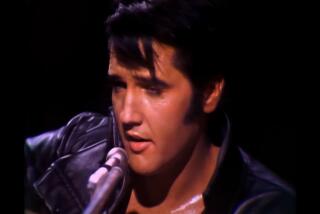Be quiet -- the director’s talking
- Share via
Since the rise of the DVD, audio commentary tracks -- directors, actors and others offering their thoughts about the movie as it plays -- have increasingly become a part of the package.
It’s impossible to know how many people listen to them, and some have a hard time believing anyone does. After watching a two-hour movie, why would you want to watch it all over again, with someone talking over it? Don’t we shush people like that in theaters?
But for a small group of film buffs, a good commentary track can mean the difference between a good DVD and a great one.
“I think the good ones absolutely enhance the watching of the movie,” says Richard Jewell, a film historian at USC. “The ones that I favor are the ones that really put the film into context and explain the artistic decisions.”
Some wonder how much they can really add to a movie. Would our appreciation of “Citizen Kane” have changed any had Orson Welles given us a shot-by-shot analysis of the film or amusing behind-the-scenes anecdotes? Probably not, but it would have been entertaining. Welles could expound on just about anything. As it is, the two-disc DVD of “Citizen Kane” comes with insightful commentary tracks from Peter Bogdanovich and Roger Ebert.
Some commentary tracks seem like nothing more than contractual obligations, actors or directors rambling aimlessly about the action on the screen or obligatorily praising their peers. But at their best, commentaries can change the way we watch movies.
Matt Zoller Seitz, a film critic for the New York Press, says commentaries have “democratized” movies by letting audiences in on how they’re made. They’ve led to a savvier audience, one that knows about camera work and how certain effects are made.
“There’s no downside to learning as much about production as possible,” he says. “I have noticed an incredible sophistication about how movies are made that was not evident a few years ago.”
As a critic, he says, that helps. It means he doesn’t have to write in simpler terms to accommodate a general audience. “They’re not going to have any problem keeping up with you, no matter how geeky you get.”
But could knowing too much take away some of the mystery of how a movie is made? Pat Hanson of the American Film Institute says that’s not a problem.
“Most people who are really into film love having the commentary because they want to get additional information about the movie,” Hanson says.
The website ratethatcommentary.com reviews nothing but the commentary tracks of DVDs and lists the 100 best and 50 worst.
“The Fisher King,” with a commentary from director Terry Gilliam, gets the highest ranking. Gilliam also gets the most placements on the list, seven. One reviewer dubs him the Michael Jordan of commentators, “effortlessly laying perfect back story, or why his instincts took the film here and not there, interesting casting anecdotes, and more.”
One of the worst? Director William Friedkin’s dreary analysis of his “The Exorcist.” “He just describes the events we can see for ourselves. Actually, he also spends a lot of time in silence,” one reviewer says.
Most on the list are either actors or directors, but a few film historians make the list. Jewell of USC has done a few commentaries, including for “I Was a Fugitive From a Chain Gang” and “Little Caesar.” He doubts that many people listen to commentary tracks, and thinks even fewer do if the commentary is from someone they’ve never heard of. But he says his own commentaries have helped film students.
Jewell felt a little strange at first sitting in a room by himself and talking for a couple of hours over a movie.
“The first time I didn’t quite know what to expect,” he says. “I time out the movies, but I don’t script it. I know how much time there is in a particular scene in a movie, but I don’t want it to feel too canned. I make the notes and go from there.”
The AFI’s Hanson has just gotten into the commentary business. For a film lover, she says, it’s hard to get used to the idea that you’re supposed to talk while the movie is playing.
“It’s a very odd and uncomfortable feeling,” she says. “There’s a sense, for me anyway, that you’re talking over the movie. It’s very difficult.”
More to Read
Only good movies
Get the Indie Focus newsletter, Mark Olsen's weekly guide to the world of cinema.
You may occasionally receive promotional content from the Los Angeles Times.







